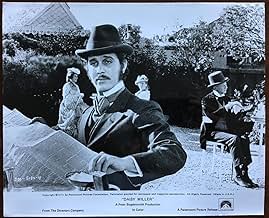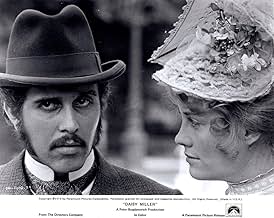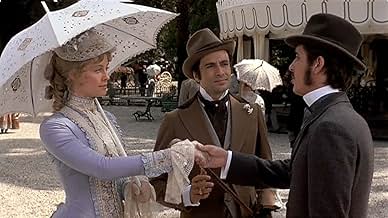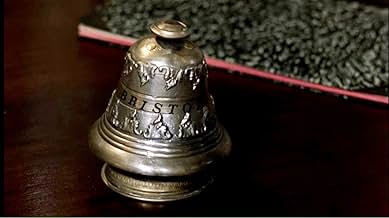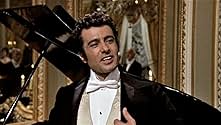IMDb RATING
6.2/10
2.2K
YOUR RATING
In this comedy of manners, Frederick Winterbourne tries to figure out the bright and bubbly Daisy Miller, only to be helped and hindered by false judgments from their fellow friends.In this comedy of manners, Frederick Winterbourne tries to figure out the bright and bubbly Daisy Miller, only to be helped and hindered by false judgments from their fellow friends.In this comedy of manners, Frederick Winterbourne tries to figure out the bright and bubbly Daisy Miller, only to be helped and hindered by false judgments from their fellow friends.
- Director
- Writers
- Stars
- Nominated for 1 Oscar
- 1 win & 1 nomination total
- Director
- Writers
- All cast & crew
- Production, box office & more at IMDbPro
6.22.2K
1
2
3
4
5
6
7
8
9
10
Featured reviews
She did what she liked.
An adaptation of the novella by Henry James (by Frederic Raphael), this stars the lovely Cybill Shepherd as the title character. Annie P. Miller, a.k.a. Daisy Miller, is an American taking a tour of Europe with her dotty mother (Cloris Leachman) and her annoying, bratty kid brother Randolph (James McMurtry). Frederick Winterbourne (Barry Brown), a young man studying in Geneva, finds himself taken with her, but at the same time he's turned off by her outspoken, carefree attitude. In fact, Daisy does indeed set tongues wagging with her liberated ways in the high society of 19th century Italy. Frederick does try to talk some sense into her, but she won't be deterred from living life her way; she actually regards him as being something of a stiff.
Produced & directed by Peter Bogdanovich, this so-so film certainly *looks* great, with excellent set & costume design and use of locations. But it never really takes an emotional hold, at least not on this viewer. The cast, in general, is good: also appearing are the amiable Duilio Del Prete as the gregarious Mr. Giovanelli, Eileen Brennan as the disapproving Mrs. Walker, Mildred Natwick as Fredericks' similarly conservative aunt Mrs. Costello, and George Morfogen as the manservant Eugenio. Brown does a fine job in his co-starring role, but this adaptation can't overcome the miscasting of Shepherd. She's able to get out reams of dialogue in a breathless manner, shows some charm, and sings quite nicely, but she's simply not a good fit for this sort of setting or material.
The material does have potential as a portrait of irreverence and individuality in a time of strict manners and morals, but overall it doesn't quite hit the mark, despite the best efforts of the crew and supporting cast.
Six out of 10.
Produced & directed by Peter Bogdanovich, this so-so film certainly *looks* great, with excellent set & costume design and use of locations. But it never really takes an emotional hold, at least not on this viewer. The cast, in general, is good: also appearing are the amiable Duilio Del Prete as the gregarious Mr. Giovanelli, Eileen Brennan as the disapproving Mrs. Walker, Mildred Natwick as Fredericks' similarly conservative aunt Mrs. Costello, and George Morfogen as the manservant Eugenio. Brown does a fine job in his co-starring role, but this adaptation can't overcome the miscasting of Shepherd. She's able to get out reams of dialogue in a breathless manner, shows some charm, and sings quite nicely, but she's simply not a good fit for this sort of setting or material.
The material does have potential as a portrait of irreverence and individuality in a time of strict manners and morals, but overall it doesn't quite hit the mark, despite the best efforts of the crew and supporting cast.
Six out of 10.
sumptuous scenery, good performances, faithful to the original story
Many reviewers here seem to have confused the story and characters with the film and the actors.
Yes, Daisy in the film is rather flat and monotonous. But that's a high compliment -- that the ravishing Cybill Shepherd could so accurately portray such a flat character. Henry James at one point describes Daisy's expression as a "light, slightly monotonous smile", in another her voice as a "little soft, flat monotone". He says late in the story that "there was always, in her conversation, the same odd mixture of audacity and puerility". No, she wouldn't be a very pleasant person to be around for long. But that was part of James's point: that our attraction to people (especially those of the opposite sex) often defies reason. Shepard makes the point well.
Some have commented that they wished the story had been filled out. Some of those apparently haven't read the story. One of those critics even places the story wrong by forty years. Though called a novella, it's barely more than a short story. In fact the film does a remarkable job of portraying the events and (more importantly) the characters very much as they are in the story. The great majority of the dialog in the film is verbatim from the story.
In some instances, the scenes and characters were significantly expanded from the James story. How far should a director go, if the aim is to film a classic story, not just to make something derived from that story? James's characters were pretty flat, a lot flatter than those in the film. One could justifiably criticize the film for telling the story far better than James did.
Do you think James's story is dated and flat in the modern world? Well, in many ways so do I. A polemical assault on discrimination based on manners and birth is truly dated. Yet an assault on personal discrimination remains fully current. The modern world is certainly not devoid of personal discrimination. Perhaps it's not often so ugly, not in the first world anyway, but prejudice is very much alive.
James's story is also unsubtle: two groups of people with differing views, one person caught with one foot in each camp, unhappy results. That's about it. Should one film the classic story, or build something different? It's a choice; great films have been made both ways. The choice for this film was unambiguous: to film the classic story.
The photography is truly gorgeous -- the film (at least the outdoor parts) was shot on location in Vevey, Switzerland and Rome, Italy. Despite the long stretches of dialog, including Daisy's run-on commentaries, one need not strain to understand the words. If the story were as good as the production and acting (several good performances) then this would be a 10. The faithfulness to the original weights it down.
Yes, Daisy in the film is rather flat and monotonous. But that's a high compliment -- that the ravishing Cybill Shepherd could so accurately portray such a flat character. Henry James at one point describes Daisy's expression as a "light, slightly monotonous smile", in another her voice as a "little soft, flat monotone". He says late in the story that "there was always, in her conversation, the same odd mixture of audacity and puerility". No, she wouldn't be a very pleasant person to be around for long. But that was part of James's point: that our attraction to people (especially those of the opposite sex) often defies reason. Shepard makes the point well.
Some have commented that they wished the story had been filled out. Some of those apparently haven't read the story. One of those critics even places the story wrong by forty years. Though called a novella, it's barely more than a short story. In fact the film does a remarkable job of portraying the events and (more importantly) the characters very much as they are in the story. The great majority of the dialog in the film is verbatim from the story.
In some instances, the scenes and characters were significantly expanded from the James story. How far should a director go, if the aim is to film a classic story, not just to make something derived from that story? James's characters were pretty flat, a lot flatter than those in the film. One could justifiably criticize the film for telling the story far better than James did.
Do you think James's story is dated and flat in the modern world? Well, in many ways so do I. A polemical assault on discrimination based on manners and birth is truly dated. Yet an assault on personal discrimination remains fully current. The modern world is certainly not devoid of personal discrimination. Perhaps it's not often so ugly, not in the first world anyway, but prejudice is very much alive.
James's story is also unsubtle: two groups of people with differing views, one person caught with one foot in each camp, unhappy results. That's about it. Should one film the classic story, or build something different? It's a choice; great films have been made both ways. The choice for this film was unambiguous: to film the classic story.
The photography is truly gorgeous -- the film (at least the outdoor parts) was shot on location in Vevey, Switzerland and Rome, Italy. Despite the long stretches of dialog, including Daisy's run-on commentaries, one need not strain to understand the words. If the story were as good as the production and acting (several good performances) then this would be a 10. The faithfulness to the original weights it down.
Curiously empty, uneventful, undramatic piece about Americans in Europe, with fatally uninteresting stars
It almost feels mean to criticise Cybill Shepherd for being so unsuitable for this role, as she is so miscast. She plays the Daisy of the title, and is dull. When we first meet her, she's a pretty, spoilt, self-obsessed tease, and that's it. 90 minutes later that's still it. Barry Brown (Frederick) is, unfortunately, equally dull and one-note. Frederick chases Daisy, she teases him, and repeat until the end credits. That's a tough watch - especially when you've seen Ms Shepherd do it before, more concisely. Mr Brown has few expressions which give a hint of anything inside him that we may care to know more about. This film needed stars, or, at least, compelling character actors. The boredom is relieved by occasional flashes of melodrama in Eileen Brennan's eyes (but even they become repetitive), and some lovely photography, but the whole is empty of story, character, history, social milieu; even the dialogue goes on too much and is either commonplace or flatly rendered. There are moments of interesting observation, but there are scant. I shall read the Henry James story on which the film is based and try to work out what it was that the makers of this vacant film were striving for.
Unfairly forgotten masterpiece
Don't let the first 10 minutes fool you, this movie is tremendous. Shepherd might seem off putting at the start, but she fully takes hold of the character and Brown's sad eyes do more to sell the story than anything. Sure it's set in a bygone age, but the feelings are totally universal and the ending is just devastating. This is totally unfairly passed over and deserves more attention. It's every bit as good as Barry Lyndon, just in a different way.
beautifully and faithfully made adaptation
I strongly disagree with the limited, parochial, and dismissive comments of other reviewers' comments. Daisy Miller is a superb and literal adaptation of the Henry James novella. It is still a joy to watch and enjoy this period piece which is perfectly cast. I completely agree with Orson Welles that Cybill Shepherd was born to play Daisy Miller. Her performance is effortless and she aptly embodies Daisy in both looks and spirit. Bogdanovich was right on the mark with the casting of Ms. Shepherd. While it is true she was his girl friend at the time, it is also true that she was perfect for the role. Her interpretation involves rushing through the dialogue as if she couldn't wait for a response so she in turn could reply and in this case it is exactly what Daisy would have done. Cybill Shepherd was at the apex of her beauty and talent in Daisy Miller. She had just starred in three great American films-Last Picture Show, Heartbreak Kid, and Taxi Driver. Daisy Miller could easily be considered along with the three aforementioned film. When I am bored with high tech films, loud action adventure films, and post modern films, I often return with great pleasure to the sumptuous and beautifully realized Daisy Miller.
Did you know
- TriviaAccording to Peter Bogdanovich, Hollywood legend Orson Welles said that actress Cybill Shepherd was born to play Daisy Miller, but he didn't want to direct Daisy Miller (1974).
- Quotes
Annie P. 'Daisy' Miller: I'm a terrible, frightful flirt. Did you ever hear of a nice girl that wasn't? But now I guess you'll tell me I'm not a nice girl.
- ConnectionsFeatured in Daisy Miller: An Introduction by Peter Bogdanovich (2003)
- How long is Daisy Miller?Powered by Alexa
Details
Box office
- Budget
- $2,200,000 (estimated)
Contribute to this page
Suggest an edit or add missing content



